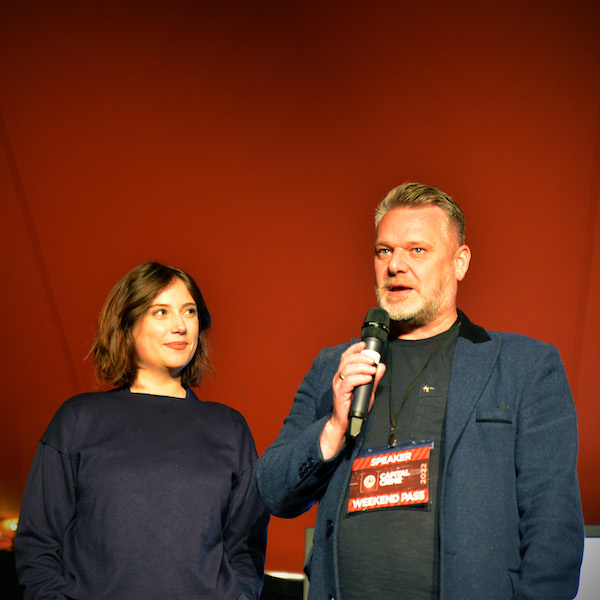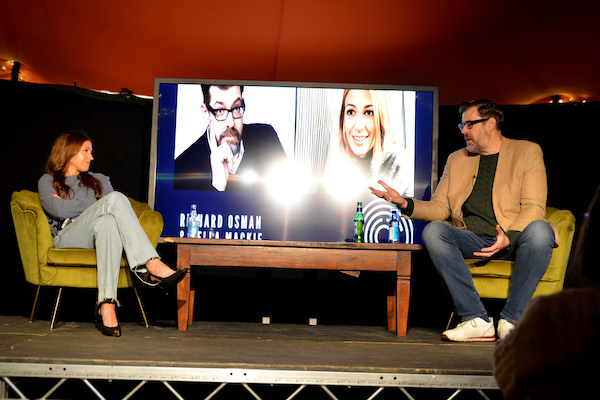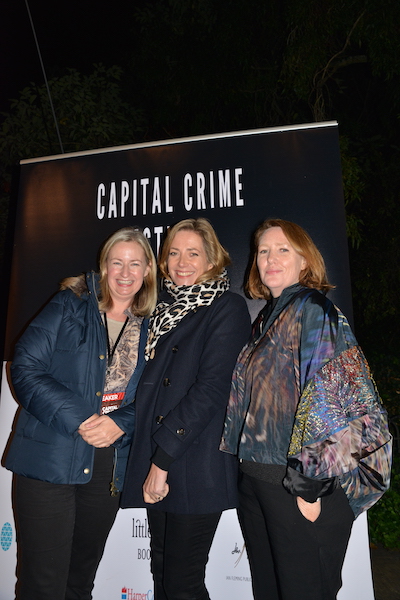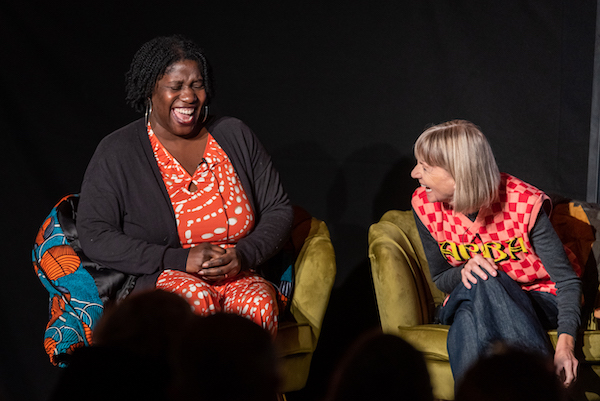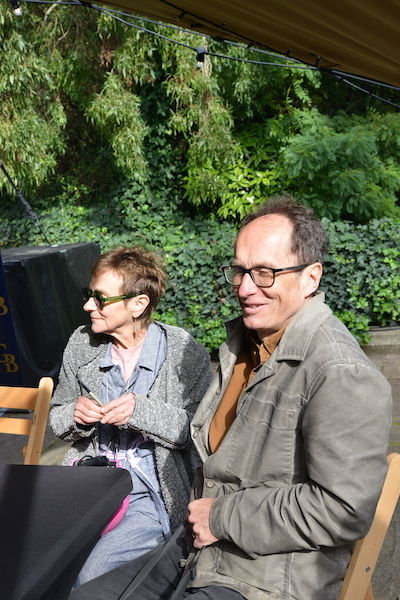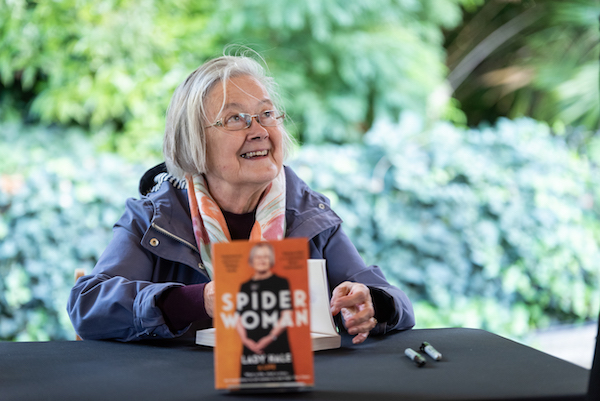Capital Crime 2022
by Karin SalvalaggioWhen bookseller and literary agent David Headley and his team launched a new London-based literary festival in September 2019, they couldn’t have foreseen the pandemic’s arrival the following spring. Covid’s toll on the capital was particularly harsh. There were days when the only sound you heard outside your windows was ambulance sirens. Going in and out of successive lockdowns made it impossible to plan anything more complicated than a socially distanced walk. Scheduling a second literary festival was impossible.
Fast-forward to September 2022 and Capital Crime’s long-awaited return. Its stunning relaunch was staged in the heart of Battersea Park, the two-hundred-acre Victorian parkland flanked by The River Thames and Battersea Power Station. The statistics are astounding considering this was only the festival’s second outing. Sheltered under two rather impressive tents and a canopied bar, one hundred and eighty authors, thirty-eight participating moderators, a half dozen security guards, fifteen sponsors, an army of FMcM publicists and a handful of volunteers came together with eager audiences to celebrate crime fiction in all its guises. Over three wonderful days in late September, hundreds of books were sold in the pop-up Goldsboro Bookshop in the Pump House Gallery and countless drinks were guzzled in the Capital Crime bar. I was unable to get the statistics on the quantity of pizzas and crepes consumed but I imagine the number was in the thousands, but maybe that was just me.
In the evening, the brightly lit bar was a beacon to crime fiction writers, publishers, bloggers, journalists and publicists who stayed for a drink or two or three.”
The English weather was its usual melodramatic self, packing four seasons into three days. It was springlike during the day on Thursday but chilly in the evening. Friday afternoon’s rain was followed by warming sunshine on Saturday. I packed my bag accordingly – everything from woolly mittens to an umbrella to sunglasses and a bikini. I live in London so took the District Line to Sloane Square. Once there, I treated myself to a black cab. After I was dropped off at the Rosery Gate I was greeted by two really lovely volunteers. As it was a beautiful afternoon, I waived the offer of a buggy and walked the short distance to the Pump House Gallery where I was met by none other than David Headley himself. A proper hug followed. David gives the best hugs.
Setting the festival outside in Battersea Park was an inspired choice, not least because it meant another Covid resurgence couldn’t get in the way of us having a good time. The low mist that hangs over the majestic trees and lawns in the morning is burned off by the afternoon. Cyclists, joggers, walkers and dogs frequent the park in high numbers, adding to the atmosphere. Goldsboro Books transformed the Pump House Gallery into a shop packed with crime novels and helpful staff. The book signing area out front opened up onto a vast lawn where the events took place under the cover of two tented seating areas. In the evening, the brightly lit bar was a beacon to crime fiction writers, publishers, bloggers, journalists and publicists who stayed for a drink or two or three. Urban foxes darted in and around the food trucks looking for scraps in the moonlight while a handful of security guards kept us safe. Buggies were available for transport to the main gate if you didn’t want to walk alone in the dark.
There were forty-two panels covering everything from advice from industry insiders to quizzes for debut novelists to more serious discussions between bestselling authors. The action kicked off at 2pm on Thursday but went from nine in the morning and until six in the evening on Friday and Saturday. The quality of the panels was extremely high. After enduring two and a half years of online book launches and virtual literary events, authors and moderators seemed especially energised, and I dare say grateful to be finally meeting face-to-face. Notable guests were pretty much everywhere I looked. Lady Hale, Harriet Tyce, Robert Harris, Ann Cleeves, Paula Hawkins, Richard Osman, S.A. Cosby, Kate Mosse, Anthony Horowitz, Ragnar Jónasson, Charlie Higson, Yrsa Sigurðardóttir, S.J. Watson, Fiona Cummins,and Iceland’s Prime Minister Katrin Jakobsdóttir are just a few names that come to mind.
Capital Crime was still going strong long after the sun went down. On Thursday evening we were treated to Elly Griffiths’ Launch Party for Bleeding Heart Yard at the bar followed by the first ever Fingerprint Awards. Championing the very best crime fiction published in 2021, the awards covered everything from debut novels to thrillers to historical fiction. I was especially touched when Thalia Proctor’s Lifetime Achievement Award was accepted by her brother. On Friday evening, the Michael Joseph drinks party held in the bar was followed crime-themed comedy performance from The Noise Next Door and gala cocktails. Saturday’s closing night was a little more laidback. Once Richard Osman finished chatting to Bella Mackie, we settled down at the bar and refused to leave until they served us everything they had left.
You have to really love crime fiction to be willing to put together an event of this scale in one the most expensive cities in the world. I’d like to extend my heartfelt congratulations and gratitude to David Headley, Lizzie Curle, Goldsboro Books, the publicity team at FMcM, and their devoted network of supporters, sponsors and volunteers for once again bringing Capital Crime to the heart of London. I attended fourteen panels over the course of the festival. I should have been exhausted but came away feeling energised and inspired. The quality of crime fiction that was featured was astounding, the range of subgenres seemingly endless. To put it bluntly, crime writers are killing it.
Some notes on a few of the panels I attended…
Ask the Industry Agent and Editor with David Headley, Camilla Bolton, Victoria Haslam, and Emad Akhtar moderated by Craig Sisterson
This panel provided some realistic insight into the state of the publishing industry today. Camilla said that choosing a book for publication is often based on instinct – Do I think eighty percent of this crowd will love this and tell their friends? Emad talked about how slots for charts in stores such as WH Smith are promotions paid for by publishers, so the industry becomes a self-perpetuating loop and that the return percentage has to be low to get shelf space for second books, but to not let any of this effect how and what you write. David described how Goldsboro Books takes a different approach, championing the books they love and focusing on special editions, which drives hardback sales. Camilla pointed out that most big brands took years to develop and that while self-publication gives the writer more control, it takes a lot of expertise you may not have, and you have to put time and money into it. Victoria added that writers need to decide what they want before going down that path and that it is an honour to be part of someone’s publication journey whether they are traditionally published or self-published previously. Emad agreed, self-publication is not a hurdle to future publication. Craig asked if traditionally published authors should be doing more? David said that the crime community is very helpful and networking with other writers is important. Show your personality online and be more visible to readers and other writers. Attend festivals and visit bookstores.
Charlie warns that you can never contradict anything in the Bond books as some nerd will call you out but that there is a lot of leeway because Bond lived in the moment. He wasn’t bogged down by real life.”
From London with Love: Anthony Horowitz, Kim Sherwood, and Charlie Higson in conversation with Samantha Weinberg
A fascinating panel featuring writers who have all spent time in the Bond universe. Kim admitted that she was hooked on Bond from the moment she saw The World Is Not Enough on television. She was transfixed by the idea of a hero who could fall off the Millennium Dome and get back up again. Thunderball was the first film Charlie saw at the cinema and he still remembers the glossy brochure. The experience encapsulated everything exciting about going to the cinema. Anthony has fond memories of going to see Dr. No at the Pantheon, Trocadero in 1962. Kingston, Jamaica blew me away and Ursula Andress… it was the day my voice broke. Anthony was careful to never break any boundaries when writing his three Bond books. He felt obliged to make himself invisible in order to capture Fleming’s use of language. Charlie warns that you can never contradict anything in the Bond books as some nerd will call you out but that there is a lot of leeway because Bond lived in the moment. He wasn’t bogged down by real life. Kim sees her books as an update but still wants Bond to be Bond.
Robert Harris and Andrew Murray Hunter in conversation
Robert discussed his use of a 17th-century manhunt as the basis of his latest novel Act of Oblivion. The 1660 Act of Oblivion was signed following the English Civil War. Truth and reconciliation would not be extended to regicides. The resulting manhunt covered England, Holland, Switzerland, Germany and America. Robert invented manhunter-in-chief Richard Nayler, setting him out as a clerk in the Privy Council and working in Whitehall Palace in what could be described as an intelligence agency. The hunted men were based on historic figures involved in King Charles I’s imprisonment and execution. General Edward Whalley and his son-in-law Colonel William Goffe were puritanical religious fanatics who fled to America. The dynamics of their relationship are important. They’re on the run. They don’t necessarily get along and they are hiding out in 17th-century New England, a rural, isolated place where a highly superstitious people are struggling survive amongst Native Americans, bears and wolves. Robert saw the book as a way of writing about America and felt its overriding theme was recovering from fractures – what seems solid will not last. It was a cat-and-mouse chase where the hunter and the hunted were three thousand miles apart. Keeping up the tension was key.
Former President of the Supreme Court of the United Kingdom, Lady Hale in conversation with Scottish barrister and novelist Harriet Tyce
Favourite quote: There is a special place in hell for women who don’t help other women.
Lady Hale called for more diversity in the senior judiciary – there are more people called David, who went to Cambridge, than there are women on the bench. Only one woman sits on the Supreme Court at the moment. She doesn’t see herself as special. She did the work and slowly moved up the ranks. She believes that judges in the UK leave lived experience at the door to allow for objectivity, whereas in the United States there is an issue. She doesn’t believe justice in the UK is at risk because party politics do not play into appointments, but she did speak about her frustration when the Daily Mail posted a photo of three judges with the headline ‘Enemies of the People’ for saying Brexit could not be triggered without a vote in Parliament and Liz Truss, who was Lord Chancellor at the time, did nothing to defend the judiciary. The Spider Brooch story was also… broached. She wore the now famous diamante pin on the day the court announced its unanimous decision that Prime Minister Boris Johnson had illegally suspended parliament. No thought was put into what she would wear. The dress was more important than brooch, but that day the brooch that usually lived on that dress was missing so she found another. She was unaware that The Who sang about a spider named Boris that comes to a sticky end.
Sinister Storytellers: What Motivates a monster? Chris Carter, Catriona Ward, Matt Wesolowski and Clare Whitfield in conversation with Yrsa Sigurðardóttir
I was quite excited about this event as I’ve read and loved quite a few of the panelists’ books. Chris described his latest novel Genesis as the darkest one yet as it was written after he lost his partner and went into lockdown grieving – My own darkness… my own pain comes through. Catriona’s Sundial, which I reviewed for Bookanista, was described as a scorched-earth desert gothic about a mother and daughter who become increasingly convinced that one is trying to kill the other. Clare’s Gone and Forgotten explores toxic gaps in information and family secrets in the aftermath of a girl’s disappearance. Matt’s brilliant novel Demon is about damaged teenagers and is an exploration of the complexity of evil and the places it comes from. Clare spoke about monsters being under the radar and how manipulation, gaslighting and narcissism all play a part. Catriona discussed the idea of ‘monsterhood’ and how we all suspect it lies within us, and her novels as a series of auditions for who is the monster. She questions whether we have free will – Hubris is monsterhood in itself. Yrsa asked why horror is fantastic. Clare believes that we can’t cope with chaos, and we make sense of chaos with books. Catriona thinks that by sharing fear at its deepest and most profound that we are rehearsing [for the worst thing that could happen]. Matt agreed, calling horror novels, edge-of-the-cliff manuals for what not to do. To which Catriona gleefully chanted, Do it! Do it!
—
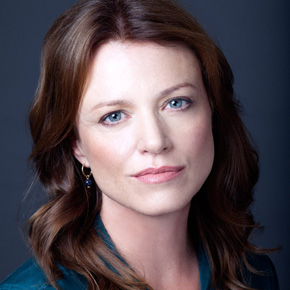
Karin Salvalaggio is the author of the Macy Greeley crime novels Bone Dust White, Burnt River, Walleye Junction and Silent Rain and a contributing editor at Bookanista. Her fiction to date is set in towns that border the Montana’s wilderness, a uniquely spectacular landscape she fell in love with as a child. Her proudly independent characters inhabit stories about the American dream gone wrong. She is currently working on a crime novel set in California. Jessica Carson has returned to her conservative roots after working as a cop in Berkeley, one of America’s most liberal cities. The transition is not without difficulties. The police detective she’s replacing was involved in the 6 January riots and her estranged son has become immersed in Antifa.
karinsalvalaggio.com
More from Karin on Bookanista
@KarinSalvala
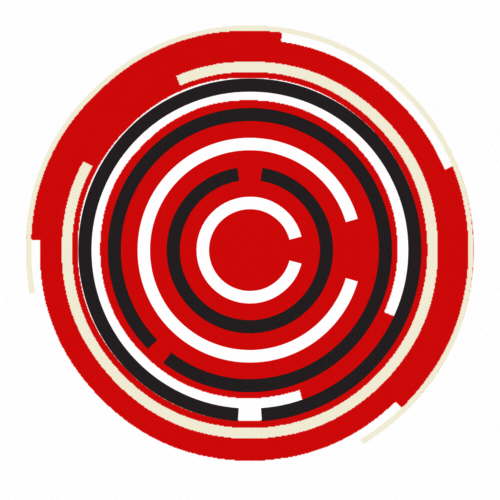
Capital Crime will return to Battersea Park in September 2023
Read more
@CapitalCrime1

